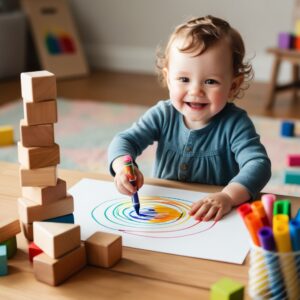One of the most gratifying experiences about being a parent is watching your toddler learn and grow. Though each child takes a different path, critical developmental milestones offer a guide on what to expect during these formative years. We examine below ten key milestones every toddler should reach to track your child’s progress and provide practical tips on how to support them during each stage.
1. Walking Independently
One of the major milestones for any toddler is to learn walking. Though some children start as early as 9 months, most children start walking independently at about 12-15 months.
- Encouraging Ways for Them to Walk: Give them ample safe space for exploration and encouraging movement with toys that require them to stand or balance.
- When to Expect: By the time your toddler is 15 months old, he should be taking some independent steps.

2. Speech Development: First Words
At about 12-18 months, the toddler typically utters the first words. By about 2 years, most toddlers already have around 50 or more words in their vocabulary and can start putting phrases together.
- Tips to Encourage Speech: Read daily, talk with your toddler frequently, and encourage naming things in their environment.
- Age to Expect: First word at approximately 12 months, sudden increase in vocabulary by 18 to 24 months.

3. Social Skills: Playing with Others
Social development begins early, and by 18-24 months, most toddlers begin to show an interest in other children. They begin playing alongside other children but may not yet interact with them. This is known as parallel play.
- Social Play Encouragement: Join group activities or arrange a playdate to help your child become used to social interactions.
- Age to Expect: Social interaction begins to get started around 18 months, and children get more interactive at age 2.

4. Developing Fine Motor Skills
By the time children reach the 12-24 months age, most of them can achieve some fine motor skills such as holding a crayon, stacking blocks, or even using a spoon.
- Development Tips: Make available play items such as stacking blocks, crayons, or play dough that enhance dexterity.
- Age to Expect: By 18 months, most toddlers can put a few blocks together or hold a spoon, and around 24 months, they begin drawing shapes.

5. Naming Body Parts
By 18 months, toddlers begin to identify and name such parts of their body. This is a big development in the child’s awareness of their person and the world around them.
- How to Encourage: Engage games like “Where’s your nose?” or sing songs mentioning body parts.
- When to Expect: By 18-24 months most toddlers are able to identify these body parts.
6. Showing Empathy and Comprehending Emotions
Empathy and understanding of feelings start developing from 18-24 months. He may look concerned when another person is distressed or imitate the feelings of others.
- Stimulating Emotional Development: Talk about feelings with your toddler and encourage him to talk about his feelings.
- Age to Expect: Generally, it starts around the age of 2 but will take more years to develop and mature.
7. Self-Feeding with Utensils
Learning to eat independently marks a great way a toddler begins to assert his or her independence. Most toddlers begin using utensils such as spoons and forks between 15-24 months.
- Encouraging Self-Feeding: Provide simple utensils and finger foods that toddlers can practice with.
- When to Expect: By 18-24 months, most toddlers are able to feed themselves with a spoon and begin to try using a fork.

8. Following Simple Directions
Around 18-24 months, children start to follow simple directions, such as “Bring me the ball” or “Put your shoes on.”
- How to Support This Skill: Give simple directions and reinforce when they do what they are asked.
- When to Expect: Most toddlers do begin to follow directions around 18 months but get really good at it closer to age 2.
9. Potty Training Readiness
Though potty training can vary widely, most toddlers give signs of readiness at age 2. Those signs generally include the fact that they remain dry for longer and show unease about wet diapers.
- Tips for Potty Training: Identify the Readiness Signs, Use a Potty Seat, and Reward
- When to Expect: This readiness typically begins to be observed at anytime between 18-30 months, with success by around age 3.
10. Showing Preferences and Making Choices
By 2 years, the toddlers start developing likes, for instance, for a particular toy they want to play with or clothes to wear. This desire reflects independence in them.
- Encouraging Independence: Allow your toddler to make small choices, like choosing the book to read or the snack.
- When to Expect: The child normally begins to express preferences at around 18 months and becomes quite insistent by age 2.
No two toddlers are exactly alike, and while milestones are a terrific guide, remember that kids develop at their own speed. The most you can do for your toddler is to encourage him, celebrating every step he makes. In this way, you’ll let him grow up confident and healthy. If you ever feel doubt about the development of your child, be advised by a pediatrician, who will consider your child’s particular needs.



